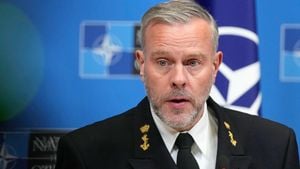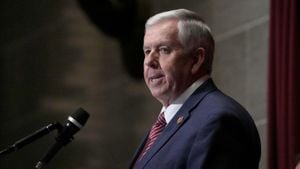The recent escalation of violence between Israel and Hezbollah has triggered intense airstrikes on Beirut, marking the fourth consecutive day of assaults as Lebanese officials evaluate a ceasefire proposal put forth by the United States. These air raids have wreaked havoc, targeting key areas within the southern suburbs of the Lebanese capital, with Israel's military claiming to focus on infrastructure utilized by Hezbollah, which remains integral to the group’s operational prowess.
According to reports from Al Jazeera, Israeli fighter jets have systematically bombed various sites linked to Hezbollah, including munitions depots and command centers. One notable strike hit near the busy Tayouneh intersection, one of the city's primary thoroughfares. Israeli authorities justified their actions by stating the intent was to quell persistent threats posed by the militant group following its provocative missile attacks aimed at Israeli positions.
Prior to the strikes, Israel issued evacuation orders to residents, urging them to relocate from potentially targeted buildings. While many complied, leading to no casualties (thanks to timely alerts), human rights organizations have criticized the abruptness of these evacuations, citing them as inadequate and alarming for those affected.
Hezbollah, for its part, hasn't remained passive; the group has retaliated by launching rockets targeting Israeli forces stationed along its northern borders. Skirmishes have reportedly occurred along the Misgav Am, Yiftah barracks, and other Israeli military sites adjacent to the Lebanese territories.
On the political front, there have been concerted diplomatic efforts to forge peace. The US ambassador to Lebanon recently presented legislative bodies with a ceasefire draft, reflecting growing optimism among local leaders about reaching some form of agreement. Officials have commented on the hopefulness surrounding Hezbollah's potential acceptance of the ceasefire, with expectations for their formal response looming soon.
Global reactions have varied, but Iran has publicly supported Lebanon's initiative for peace talks, indicating its backing for the Lebanese government's attempt at negotiation. This coalition and the support from Iran cover multiple angles, with hopes of mitigating the humanitarian disaster unleashed by the recent conflicts.
The situation remains dire for the civilian population. Humanitarian agencies report mass displacement, with over one million Lebanese individuals forced from their homes amid the chaos. The intense warfare has resulted in staggering casualties—recent estimates suggest at least 3,386 fatalities and 14,417 injuries across Lebanon due to continuous Israeli airstrikes since the hostilities reignited on October 7.
Adding complexity to the conflict, the recent assassination of key figures from Hezbollah, including its prominent leader Hassan Nasrallah, has left the organization under severe scrutiny. Observers note the changing dynamics within the group, as new figures rise to take charge amid relentless military actions by Israel.
Compounding the tension, last weekend, Israeli police reported flares being shot at Prime Minister Benjamin Netanyahu's private residence, following recent attempts by Hezbollah to strike civilian targets within Israel. Although the prime minister's family was not present during the incident, the act sent shockwaves through Israeli security circles.
Further complicate matters, mass protests have erupted within Israel, as the public expresses frustration over the handling of the hostage crisis and the broader war response against Hamas. Many are calling for decisive actions and more substantial diplomatic engagements to aim for peace.
The path forward is fraught with geopolitical calculations, and it remains unclear whether the latest US-brokered ceasefire can stem the tide of conflict. Analysts suggest the interplay between military actions from Hezbollah and the Israeli retaliation continues to overshadow any peaceful resolutions. Whether the pressing need for humanitarian relief and the pressure from the international community can puncture the existing hostilities remains to be seen.
With both sides entrenched and uncertainty surrounding the effectiveness of diplomatic overtures, the prospect of peace feels as distant as ever amid tragedy and loss.



